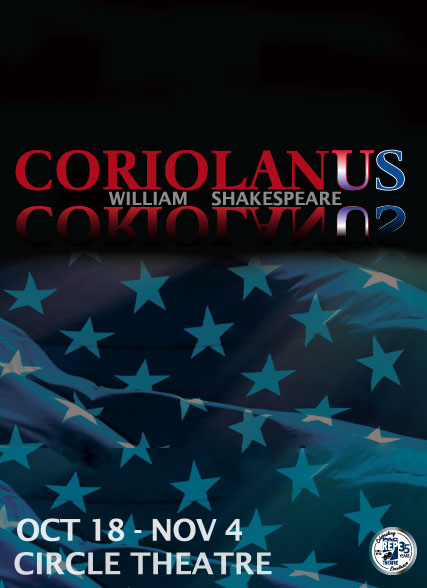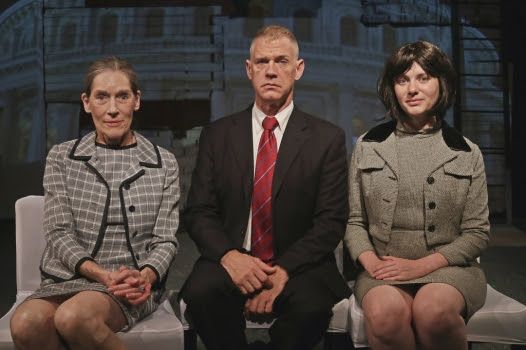|
Pacific Repertory Theatre uses Vendini for ticketing, marketing, and box office management.
Pacific Repertory Theatre – PO BOX 222035, Carmel, CA, 93922, (831) 622-0100
Vendini, Inc. – 660 Market Street, San Francisco, CA, 94104, 1 (800) 901-7173
View as a web page.

A rare opportunity to see one of Shakespeare’s less commonly produced but strong character studies.
Coriolanus
by William Shakespeare
Oct 19 – Nov 4 • Circle Theatre
Directed by Ken Kelleher
PacRep continues its exploration of Shakespeare’s Roman plays with a new and relevant adaptation of Coriolanus, a timely political piece that deals with the violent and messy beginnings of democracy, and a powerful commentary on class politics and the nature of patriotism.
Caius Martius Coriolanus is a fearless soldier but a reluctant leader. His ambitious mother attempts to carve him a path to power yet he struggles to change his nature and do what is required to achieve greatness. Now he must decide who he really is and where his allegiances lie in a new city state struggling to find its feet, where the gap between rich and poor widens every day.
Here I will play Senator Menenius, friend of Coriolanus, who endeavors to guide him toward political mastery. This is a role that has been on my “wish-to-play list??? for about forty years.
Performing Arts Monterey Bay
Coriolanus
By Philip Pearce
Posted on October 22, 2018
I LEARNED SOMEWHERE on the internet that Bertolt Brecht was at work on his own version of Coriolanus but died before he could finish it. I was fascinated but not surprised. Kenneth Kelleher’s rousing new PacRep production at the Circle Theatre only deepens my conviction that of Shakespeare’s plays, Coriolanus is the most Brechtian.
Which is to say it doesn’t offer fully rounded characters with accessible emotions and challenging attitudes. Instead it offers an artful portfolio of caricatures moving through a carefully crafted plot full of rash, one-track decisions ending in disaster. As in a Brecht acting company, these performers aren’t trying to win your sympathy, approval or support. They are illustrations of patterns of behavior we pay to watch and critically judge from a detached distance.
This new Coriolanus is a loud and relentless example of Shakespeare writing at the top of his voice about a man obsessed with violence. The role is played with a terrifying raw power by Jonathan Rhys Williams. Forget the reflective wit and wisdom of Hamlet or the inner moral struggles of Macbeth. In this last of the tragedies, it’s all out in bold, plain sight with Caius Martius of Rome. Pathologically fearless in battle, he focuses on a single-minded beating down of every enemy, foreign or domestic. He doesn’t pause, evaluate or reconsider. It’s his way or nothing. Except for one brief plea for mercy on behalf of an enemy peasant who housed him during a battle, he shows little human sympathy for anyone and is totally lacking in humor. His spectacular military exploits in a Volscian city called Corioli earn him the proud political soubriquet ‘Coriolanus’ from the Roman Senate along with an invitation to run for the office of consul. But he is so incapable of political spin or crowd pleasing rhetoric that his venture into Roman politics snowballs into disaster and death.
As with him, so with the one-track, sharp tongued horde of people who surround him. Kelleher’s brilliant direction keeps each of these single-motive interest groups placed where it’s easy to see who’s who and understand what it is they are each struggling to achieve. There are strong character contrasts but don’t look for subtle character development. It’s not that kind of show. The cast move with the patterned predictability of pieces in a game of chess.
The single obsession in the heart of Coriolanus’ lifetime sworn enemy Tullus Aufidius is to destroy Coriolanus. Played by Will Springhorn, Jr. with voice and body language that closely mirror the icy blood lust of Williams’ Coriolanus, Aufidius, like Coriolanus, never recognizes the simple fact that he despises that other guy so deeply because the two of them are so frighteningly alike.
In sharp contrast, there’s Coriolanus’ ingratiating father figure and polar opposite Menenius, played by Jeffrey T. Heyer with the practiced charm of an experienced Southern Senator (complete with Mason-Dixon accent) who seems at first to be a sincere peacemaker but whose public benevolence looks more and more like a carefully practiced political veneer as the evening progresses. That said, Heyer’s powerful explosion of hot rage when ultimately denied access to the exiled Coriolanus’ headquarters in Act 2 adds a layer of harsh realism that’s deliberately missing from most of the other carefully stylized performances.
Coriolanus, of course, doesn’t come by all that towering aggression by accident. He’s been trained up from infanthood by his agate-hearted mother Volumnia. Acted with a lot of steely conviction by the wonderful Jessica Powell, this lady confides at one point to her daughter-in-law Virgilia (in a pleasantly feisty interpretation of the part by Elyse Sharp) that she’s always gotten a bigger thrill out of viewing a fighting man’s bleeding battle wounds than from anything anyone’s been able to do with her in bed.
Howard Burnham is an earnest worrywart general named Cominius, who is generously over the moon when Coriolanus out-battles him in their fight against Volscian invaders but gets all knotted up with doubt and anxiety when his young colleague later launches an unwarranted military attack against his birthplace.
Coriolanus’ political downfall stems from his being unable to sweet talk a rebellious mob of workers out of their rage at finding the government is hoarding grain while they go hungry. A couple of ambitious upwardly mobile tribunes named Sicinius Veluta (Julie Hughett) and Junius Brutus (D. Scott McQuiston) take up the populist revolt, not because they care about workers’ rights but because it gives a temporary boost to their determination to destroy Coriolanus.
PacRep gets political with Shakespeare’s ‘Coriolanus’
By CHRIS COUNTS
JUST IN time for the mid-term elections, PacRep Theatre serves up a commentary on contemporary politics with William Shakespeare’s “Coriolanus,??? which plays at the Circle Theatre through Nov. 4.
Written by Shakespeare in the early part of the 17th century, “Coriolanus???
follows the rise of a Roman general whose courage and success open up political opportunities. But he finds the political arena more treacherous than the battlefield, and he is banished from Rome for voicing “undemocratic??? ideas. But he soon returns with an army at his back and vengeance on his mind.
Instead of ancient Rome, PacRep sets the play in America in the 21st century. “This powerful commentary on class politics and the nature of patriotism is a timely political piece that deals with the violent and messy beginnings of democracy of that time,??? PacRep executive director Stephen Moorer told The Pine Cone.
Directed by Ken Kelleher, the play stars Johnathan Rhys Williams as general-turned-politician Caius Martius Coriolanus. The cast also includes Jessica Powell, William Springhorn Jr., Nina Capriola, Joseph Cardinale, Jeffrey T. Heyer, Elyse Sharp and others.
Without mentioning President Donald Trump by name, the cast members suggest
Coriolanus has a modern-day equivalent that we need to be concerned about. Capriola said the play tells the story of “a proud an arrogant leader who gets taken down.??? Sharp noted Coriolanus “doesn’t fit well in political
world of Rome,??? where “he’s not used to democracy.??? Williams called the parallels between Shakespeare’s story and our modern
world, “kind of creepy and kind of amazing.???
The play continues Thursdays, Fridays, Saturdays and Sundays. All shows start at 7:30 p.m. except Sunday matinees, which begin at 2 p.m. Tickets are $8 to $38, with discounts available for children, students, teachers, seniors and active military. The Circle Theatre is located on Casanova between Eighth and Ninth. Call (831) 622-0100 or visit wwwpacrep.org.
 Johnathan Rhys Williams (left) battles William Springhorn Jr. in PacRep’s
Johnathan Rhys Williams (left) battles William Springhorn Jr. in PacRep’s
“Coriolanus,??? which plays at the Circle Theatre through Nov. 4.
Equity actor Johnathan Rhys Williams plays the title role in “Coriolanus,??? a Pac Rep production.
By BARBARA ROSE SHULER |
October 25, 2018 at 6:41 am
A famous man is elevated to a position of power in a dominant nation by forces that seek to control his words and deeds for their own ends. The man’s hubris, impulsiveness and aggression destabilize established political structures as his hostile rhetoric infuriates the general population. Bad decisions made in response to his chaotic actions threaten to destroy the homeland. When the ruling class realizes the man has made a dark alliance with an enemy of the state, it may be too late to restore order.
Sound familiar?
The artists of Carmel’s Pacific Repertory Theater think so. Their current play, directed by Kenneth Kelleher, is Shakespeare’s “Coriolanus,??? based on Plutarch’s tale of Caius Martuis, the Roman leader who proved disastrously unable to execute the duties of his office.
So many of we humans carry flawed motivations and ambitions. The story of Coriolanus serves as a warning against abuses of power across a wide spectrum of isms and ideologies. As we Americans near our fraught midterm elections, these lessons are worth heeding. It’s no surprise that PacRep joins theater companies, here and abroad, in presenting this play right now.
Kelleher places the tale in our era of cell phones, video calls and ubiquitous TV cameras. The drama unfolds in PacRep’s intimate Circle Theatre, surrounding the audience in an inside-the-action manner. You may find yourself shaking Coriolanus’s hand or bumped by a character wielding a video device. The action is close, mesmerizing and impactful.
The show begins with an insurrection as rioters with baseball bats surge onto the stage to the refrain of a Buffalo Springfield song:
“It’s time we stop; hey, what’s that sound? Everybody look what’s going down…???
Plebeians of Rome accuse the elites of hoarding the food and allowing them to starve. They blame in particular a general who spits contempt for the common people.
Equity actor Johnathan Rhys Williams appears in the title role: General Caius Martius is honored for his military success with the name Coriolanus.
Williams masterfully portrays a man prone to arrogant dyspeptic meltdowns. He’s a loose cannon hurling dangerous words into crowds, even as his patrician minders beg him for mildness and charity.
Williams gives us a telegenic modern-media Coriolanus with athletic charisma. The actor possesses an easy mastery of Shakespearian speech and proves a supple physical performer who seems genuinely at home in this demanding role.
He walks a razor-thin edge between craziness and reason. The quality of tense emotional brinkmanship in his performance rarely lets up. In spite of his arrogant aggression, the general-politician has a rough appeal, as is right for this tragic figure who is also a hero.
Equity actor Jessica Powell offers excellent fierce counterpoint to Coriolanus as his domineering, ambitious mother, Volumnia, who urges him to undertake a political career following his military success. Wrong move, Mom.
In another strong performance, William Springhorn Jr. as Coriolanus’s chief rival and frenemy, Affidius, conveys integrity and nobility clearly lacking in Coriolanus. These two generals both respect and detest each other in the manner of warriors who recognize a battle-perfect adversary. There were moving, even tender moments between Springhorn and Williams in this regard.
As the Roman senator Menenius Agrippa, Jeffrey T. Heyer slips into the folksy southern drawl of a charming American lawmaker as his character navigates the challenges of managing the campaign of his comrade Coriolanus. Heyer deftly portrays a politico used to manipulating minds and emotions to achieve his ends. He worries about his friend, though: “There is no more mercy in him than there is milk in a male tiger.???
Julie Hughett and D. Scott McQuiston play the two cunning tribunes who represent the citizen population of Rome, whose power Coriolanus abhors. They make a sassy and oddly engaging Tweedledum and Tweedledee of the people, scheming and fidgeting until foolishly demanding banishment of Coriolanus.
Howard Burnham makes an impressive Cominius, the respected Roman consul, whose loyalty to Rome is steadfast though he fails to talk sense into his buddy Coriolanus.
Elyse Sharp as Coriolanus’s vapid wife, Virgilia, is reminiscent of attractive but expressionless spouses of some of our modern politicians. Her friend Valeria has a much livelier and chattier demeanor, portrayed with brio by Nina Capriola. Young Joseph Cardinale turns in a focused and poignant performance as Coriolanus’s son.
The large ensemble includes Mike Baker, Douglas Johnson and others switching in and out of a variety of roles as the action sprints forward. An effective Citizen Video Ensemble appears on the screen periodically to represent the Roman plebeians.
The walls of Kelleher’s sets double as screens for his videos and stills. His scenic design creates an unusual feel of depth for this stage, using a lean and functional use of the space with smart dependence on projected images, sound, video, lighting (Les Solomon), and an original composition by David Eaken. Abra Bermans’s costumes display contemporary military apparel for the generals and soldiers, business suits for the male patrician elites, sleek modern attire for the women, and a hoodie-wearing rabble.
In this production, Kelleher and company seem to suggest that any resemblance to actual persons or events is not at all coincidental. From ancient Rome to Elizabethan England to Carmel Circle Theater, no fictitious disclaimers needed.











